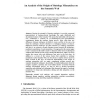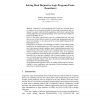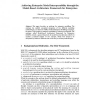55 search results - page 11 / 11 » Why Use a Unified Knowledge Representation |
EKAW
2008
Springer
13 years 6 months ago
2008
Springer
Despite the potential of domain ontologies to provide consensual representations of domain-relevant knowledge, the open, distributed and decentralized nature of the Semantic Web me...
AGP
2003
IEEE
13 years 10 months ago
2003
IEEE
Disjunctive Logic Programming (DLP) under the consistent answer set semantics is an advanced formalism for knowledge representation and reasoning. It is, under widely believed assu...
DOCENG
2009
ACM
13 years 11 months ago
2009
ACM
In this paper we propose a novel approach to markup, called Extreme Annotational RDF Markup (EARMARK), using RDF and OWL to annotate features in text content that cannot be mapped...
JCC
2007
13 years 4 months ago
2007
: We summarize our contributions on the quest of new planar tetracoordinate carbon entities (new carbon molecules with exotic chemical structures and strange bonding schemes). We g...
CAISE
2004
Springer
13 years 10 months ago
2004
Springer
This paper describes an ontology for enterprise modelling, The ontology has enabled conceptual integration of two different modelling methodologies, one based on UEML (Unified Ente...



